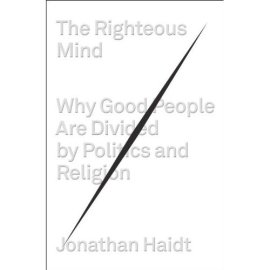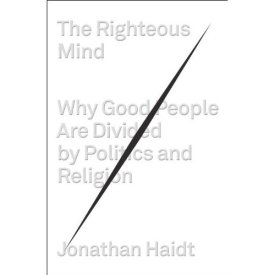Category Archives: Social Psychology
The Righteous Mind – The Intuitive Dog and Its Rational Tail
Posted by SciAwakening
This is Part 3 of my journey through The Righteous Mind. Here is Part 2.
The social intuitionist model offers an explanation of why moral and political arguments are so frustrating: because moral reasons are the tail wagged by the intuitive dog. A dog’s tail wags to communicate. You can’t make a dog happy by forcibly wagging its tail. And you can’t change people’s minds by utterly refuting their arguments. If you want to change people’s minds, you’ve got to talk to their elephants.
– Jonathan Haidt
And as reasoning is not the source, whence either disputant derives his tenets; it is in vain to expect, that any logic, which speaks not to the affections, will ever engage him to embrace sounder principles.
– David Hume
At this point in the book Jon describes the distinction of “seeing-that” versus “reasoning-why”. The thinking here is that our reactions to religious and political statements come from a low-level rapid and unconscious pattern matching engine in our minds. Research by Howard Margolis (building on previous work by Peter Wason) ultimately led both to the conclusion that judgment and justification are separate processes.
Margolis sees these as two different cognitive processes. The “seeing-that” process is a form of pattern matching that all animals do and is a highly evolved and deeply ingrained part of all animal brains after hundreds of millions of years. The “reasoning-why” process is brand spanking new in evolutionary terms and is only available to beings that have evolved language and have a need to justify their actions to other highly evolved beings. And of course we anthropomorphize lower animals, objects, and concepts when, out of frustration or a sense of comedy, we try to reason with something like our car or our dog. The point is that the reasoning process is not automatic, it is a slower, conscious process that is bolted on top of our ancient, powerful, and efficient pattern-matching process. Read the rest of this entry →
Posted in Books, Morality, Philosophy, Psychology, Social Psychology
Tags: cognition, Jonathan Haidt, judgment, justification, The Righteous Mind
The Righteous Mind – The Origins of Morality
Posted by SciAwakening
This is “Live Blogging The Righteous Mind” Part 2. Here is Part 1.
Reason is, and ought only to be the slave of the passions, and can never pretend to any other office than to serve and obey them.
– David Hume
The mind is divided, like a rider on an elephant, and the rider’s job is to serve the elephant.
– Jon Haidt
 Jon used the elephant/rider metaphor before in his wonderful book The Happiness Hypothesis. The elephant is our ancient, emotionally driven limbic system. It is a deep part of our evolutionary past, but still very much a part of who we are in the present day. The rider is a newcomer on the scene, the pre-frontal cortex in the brain. Full of grand plans and bright ideas but most of the time very much unaware that it is controlled and manipulated by the lumbering beast down below. The elephant does what it wants, when it wants, and the rider, strapped on the beast and unable to climb off, rationalizes, confabulates, and groans in frustration when the elephant once again disobeys its commands. When the elephant is ambivalent the rider can gain a measure of control, but when the elephant has a strong desire, the rider is just a simple passenger who’s along for the ride.
Jon used the elephant/rider metaphor before in his wonderful book The Happiness Hypothesis. The elephant is our ancient, emotionally driven limbic system. It is a deep part of our evolutionary past, but still very much a part of who we are in the present day. The rider is a newcomer on the scene, the pre-frontal cortex in the brain. Full of grand plans and bright ideas but most of the time very much unaware that it is controlled and manipulated by the lumbering beast down below. The elephant does what it wants, when it wants, and the rider, strapped on the beast and unable to climb off, rationalizes, confabulates, and groans in frustration when the elephant once again disobeys its commands. When the elephant is ambivalent the rider can gain a measure of control, but when the elephant has a strong desire, the rider is just a simple passenger who’s along for the ride.
Understanding the simple fact that morality differs around the world, and even within societies, is the first step toward understanding your righteous mind.
Jon takes us through a winding history of morality in the West. The nativists who prize nature, the empiricists who prize nurture and the rationalists who believe that children figure out morality for themselves. Children grow into rationality as caterpillars grow into butterflies. Piaget and Kohlberg were both famous psychologists who championed rationalism. Kohlberg came up with the famous idea of pre-conventional, conventional, and post-conventional stages of morality that children go through on the way to adulthood. Rationalism valued self-discovery and authority figures were ultimately just a roadblock in the way of natural development. This thinking eventually led to a liberal consensus that morality is mainly about justice. It’s about harm and fairness and NOT about loyalty, respect, duty, piety, patriotism, or tradition.
Posted in Books, Morality, Philosophy, Psychology, Social Psychology
Tags: books, Jon Haidt, morality, psychology, The Righteous Mind
Live Blogging The Righteous Mind
Posted by SciAwakening
 I’m going to try something a bit different over the next week or so. I’m going to read Jonathan Haidt’s new book about moral psychology, The Righteous Mind, and blog my thoughts as I read through the book. Most people write short summaries and critiques of entire books, but I thought it might be interesting to write my thoughts and present them as I read through a new book. I’ll try to combine as many thoughts as I can into single blog entries in order to avoid inundating people with new blog post notifications. So without further ado, here are my thoughts on The Righteous Mind:
I’m going to try something a bit different over the next week or so. I’m going to read Jonathan Haidt’s new book about moral psychology, The Righteous Mind, and blog my thoughts as I read through the book. Most people write short summaries and critiques of entire books, but I thought it might be interesting to write my thoughts and present them as I read through a new book. I’ll try to combine as many thoughts as I can into single blog entries in order to avoid inundating people with new blog post notifications. So without further ado, here are my thoughts on The Righteous Mind:
We start off the book with a quote from Baruch Spinoza from his Tractatus Politicus:
I have striven not to laugh at human actions, not to weep at them, not to hate them, but to understand them.
It’s pretty clear that one of the main themes of the book will be prizing understanding over judgment, something that I’ve become a big fan of recently. In that regard it appears there might be some concurrence between this book and the last book I read, Sam Harris’ Free Will. I know that Jon has a large measure of philosophical disagreement with the “New Atheists” so it will be interesting to see how this all pans out.
Introduction
We start off the introduction with a discussion about Rodney King and his rarely quoted response to the 1992 Los Angeles riots:
Please, we can get along here. We all can get along. I mean, we’re all stuck here for a while. Let’s try to work it out.
Posted in Books, Morality, Politics, Psychology, Religion, Social Psychology
Tags: books, Jon Haidt, news, Politics, psychology, reading, religion, The Righteous Mind



